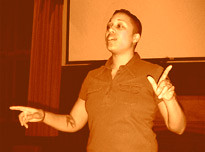Lucy/Chambers is yet another piece from Heru. I really like this one, especially the section which includes the line I'm using as the title of this entry.
He reminds me of how Saul Williams broke down the word dis/orient and said it meant "to turn away from the East".
In other words, Williams (and Paul Robeson, and probably Heru) are saying that we are lost and disoriented because we cling too firmly to Western values. And in order to be "found" and properly "oriented" we need to look to the Orient (at least partially).
I think the "we be broke..." line is deep and hilariously clever. On the other hand (and I am overanalyzing it, but that's ok because it is really just a way to introduce some other topics) the more I thought about the line, the more I wanted to question whether or not it was actually true.
Are we (Black folks in America) really spritually broke? How do you even start to measure the spiritual wealth of a whole group? In my mind, the question is tied into a recent conversation over at the The Manrilla blog about the role of Arabic (or more precisely, Arab people) in the revelation of the Quran. Should a religious Muslim view the Quran as an accomplishment of Arab people? (You can read the discussion over there, but my basic answer: "no".)
Or moving along to the next part of the line, can the I Ching be viewed as an accomplishment of Chinese civilization? Another thought: Are "Oriental" people really more spiritual anyway? I'm admittedly working from a skewed sample but many of the East Asians I know are either Christian, or think that religion is for "old people" and so they don't think about it much. Most of the Indians I know seem to treat yoga like something which they learned in gym class (which it often is) rather than a deep spiritual practice. It seems like globally, most folks are fairly secular and caught up in the world, and it is only a minority in any civilization who worry much about spiritual things.
In fact, the more I think about the "we be broke..." line, especially in the context of the whole piece, the more I suspect I was misreading it earlier. The main clues are the multiple references to Ausar Auset (In fact even the name Heru is associated with the Ausar Auset and their version of the Tree of Life). Ausar Auset seems to encourage yoga, meditation, the kabbalah and other spiritual practices, including study of the I Ching. So if Heru is a part of the movement, it seems more likely that the line is his way to be genuinely humble about the fact that from his perspective, his own pockets are fat with spiritual "loot".
Anyway, I'm going to basically stop here. I know very little about Ausar Auset so I shouldn't "pontificate" about them out of ignorance. But since this is Planet Grenada, I will mention that the founder, Ra Un Nefer Amen (Rogelio Alcides Straughn) was born in Panama.
I'll leave you with some relevant links... until next time.
Grenada's past:
more on heru, the pan-african spoken-word artist
heru on the bush administration
saul williams
disoriented
i ching and the tao of islam
Those who hate what I’m saying right now are those who saw the slave ships coming and bowed. Those are the same people who would sell out their own people for trinkets and shiny things. They never say a word in African tongue like "uhuru" but are quick to say “Bling bling bling bling bumbleclot bling”. So you best turn off your tv unless you watchin’ Discovery or Nova. Because we need to start higher forms of meditation like yoga or Tantric Buddhism or something. Because we be broke while other folks’ cash registers be like “I Ching” “I Ching” “I Ching”
He reminds me of how Saul Williams broke down the word dis/orient and said it meant "to turn away from the East".
In other words, Williams (and Paul Robeson, and probably Heru) are saying that we are lost and disoriented because we cling too firmly to Western values. And in order to be "found" and properly "oriented" we need to look to the Orient (at least partially).
I think the "we be broke..." line is deep and hilariously clever. On the other hand (and I am overanalyzing it, but that's ok because it is really just a way to introduce some other topics) the more I thought about the line, the more I wanted to question whether or not it was actually true.
Are we (Black folks in America) really spritually broke? How do you even start to measure the spiritual wealth of a whole group? In my mind, the question is tied into a recent conversation over at the The Manrilla blog about the role of Arabic (or more precisely, Arab people) in the revelation of the Quran. Should a religious Muslim view the Quran as an accomplishment of Arab people? (You can read the discussion over there, but my basic answer: "no".)
Or moving along to the next part of the line, can the I Ching be viewed as an accomplishment of Chinese civilization? Another thought: Are "Oriental" people really more spiritual anyway? I'm admittedly working from a skewed sample but many of the East Asians I know are either Christian, or think that religion is for "old people" and so they don't think about it much. Most of the Indians I know seem to treat yoga like something which they learned in gym class (which it often is) rather than a deep spiritual practice. It seems like globally, most folks are fairly secular and caught up in the world, and it is only a minority in any civilization who worry much about spiritual things.
In fact, the more I think about the "we be broke..." line, especially in the context of the whole piece, the more I suspect I was misreading it earlier. The main clues are the multiple references to Ausar Auset (In fact even the name Heru is associated with the Ausar Auset and their version of the Tree of Life). Ausar Auset seems to encourage yoga, meditation, the kabbalah and other spiritual practices, including study of the I Ching. So if Heru is a part of the movement, it seems more likely that the line is his way to be genuinely humble about the fact that from his perspective, his own pockets are fat with spiritual "loot".
Anyway, I'm going to basically stop here. I know very little about Ausar Auset so I shouldn't "pontificate" about them out of ignorance. But since this is Planet Grenada, I will mention that the founder, Ra Un Nefer Amen (Rogelio Alcides Straughn) was born in Panama.
I'll leave you with some relevant links... until next time.
Grenada's past:
more on heru, the pan-african spoken-word artist
heru on the bush administration
saul williams
disoriented
i ching and the tao of islam

